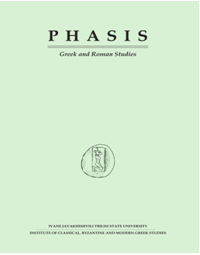Pater Aeneas, errans et oboediens
Abstract
Aeneas incorporates the images of Achilles and Odysseus. His destiny and character, however, distinguish him from both heroes. Achilles is a brave warrior of incomparable power fighting for honor; the purpose of his perilous voyage is to return home. Aeneas is a hero who is entrusted with a special mission and who leaves Burning Troy by the gods’ will in order to "return" to his new homeland. So, how does the shaping of Aeneas’s character take place after leaving Troy and how does this courageous warrior from a defender of his land turn into a hero implementing the gods’ will? Aeneas, who implements the divine will, yields to human desires prior to arriving in Latium although he understands that it is impossible to follow the will of the gods being preoccupied with human pleasures. He gradually disposes himself of the human weaknesses, forsaking his love in Carthage, relinquishing the desire to relish peaceful life (expressed in the construction of cities) on different islands, and parting with his intimate link with the past together with Anchises’s death. Thus, deprived of human weaknesses, he arrives in Italy. "The just, pious, and militarily skilled Aeneas" (I 544-545; VIII 235) becomes vigilant, perceptive of and obedient to the will of the gods. He is convinced that being the chosen man of the gods is an honorable but cumbersome task that requires forgoing personal pleasures. This realization must explain the absence of Aeneas’s joy for his victory at the end of the poem when he gives his son instructions to take lessons of gallantry and valor from his father but learn how to be happy from others.


